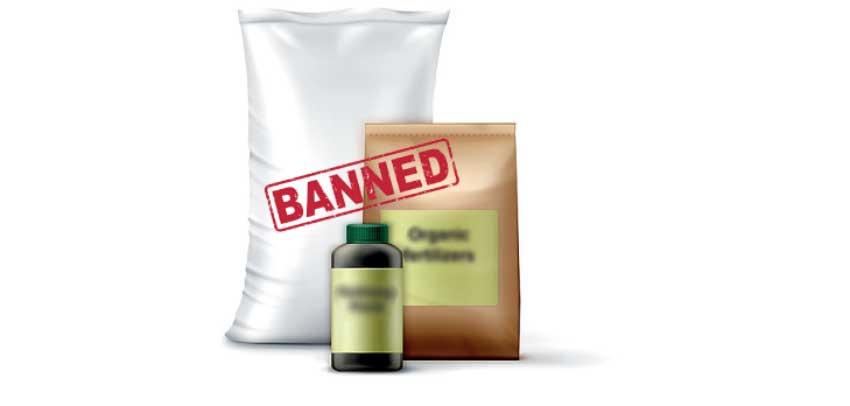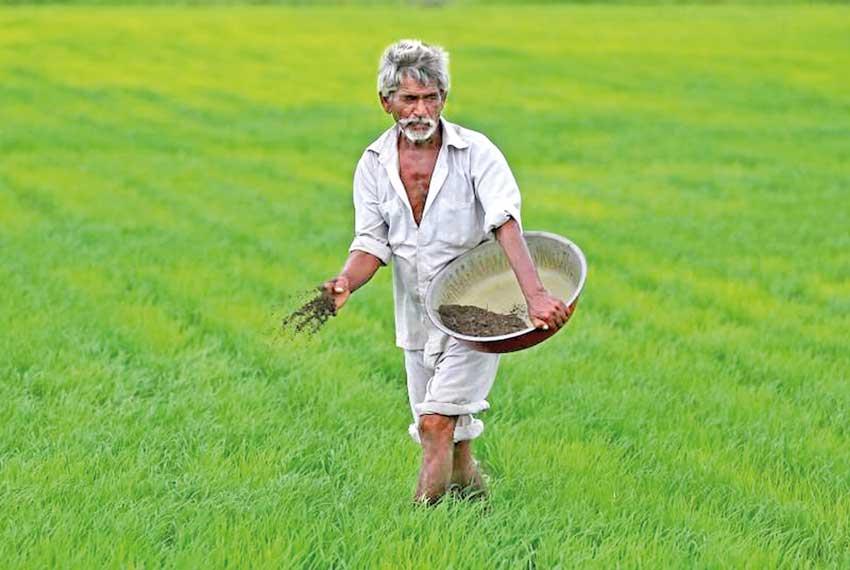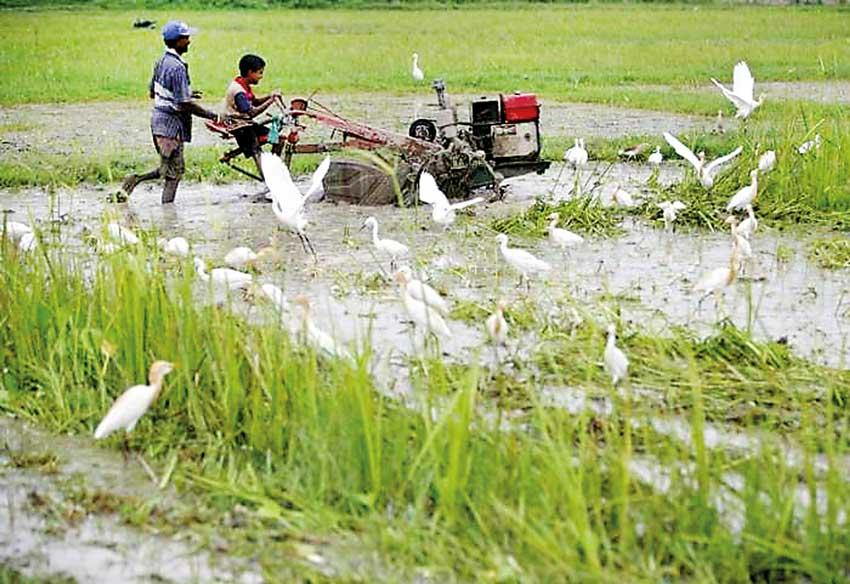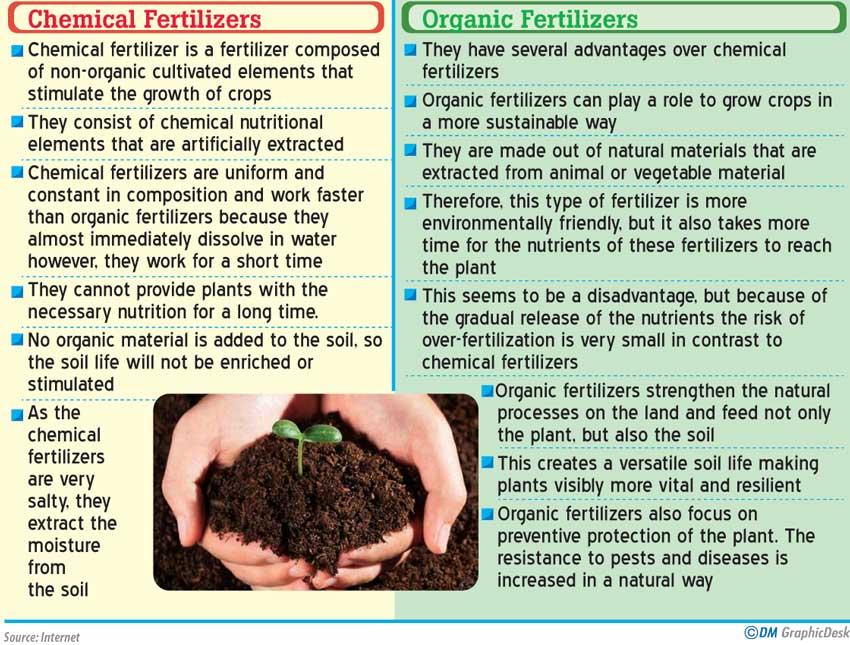06 May 2021 - {{hitsCtrl.values.hits}}


A farmer spreads fertilizer mixed with potash in his paddy field (Reuters)
@Piyumi_Fonseka on Twitter
Soil makes up as the home to millions of insects, microorganisms, recycle matter and store water. More than 95% of the food produced in the world is from the land. However, the Status of the World’s Soil Resources Report (SWSR) in 2015 has identified soil pollution as one of the key threats to the global soils. Soil pollution has a direct impact on food security in different ways. When it comes to Sri Lanka since vegetable and fruit cultivation in Sri Lanka is an intensive and highly commercialized system, the management of fertilizers and amendments are critical for sustainable production.
The worrying fact is that many researchers have found that Phosphate fertilizer is a main source of arsenic in areas affected by Chronic Kidney Disease in Sri Lanka. In South Asia, Sri Lanka is the most affected, with the highest number of CKD patients. In 2014, Sri Lanka’s Ministry of Health documented 16,479 CKD cases. In 2015, the number was 20,828. The numbers keep increasing alarmingly. The incidence of the disease has increased dramatically in the country’s North Central Province.

A man teaches his son how to prepare rice fields using a tractor
(Reuters)
Why ban agrochemicals?
The Cabinet approval was received last month for President Gotabaya Rajapaksa’s proposal to ban the importation of chemical fertilizers. According to the Ministry of Agriculture, the excessive use of chemical fertilizer has led to blue childbirths while medical surveys reveal that 30 blind childbirths reported per month in Sri Lanka. The number of Kidney and Cancer patients is on the increase.
As Hydrologist Tissa Illangasekare pointed out a clue for such prevalence in North Central Province may lie in the poor quality of the region’s drinking water.
“Farmers in areas where CKD is common to obtain drinking water from irrigation canals that are recharged by deep-bore wells. When water levels are low, toxic chemicals may concentrate in the well-bases. The correlation of poor-quality drinking water from wells with the occurrence of the disease has been established,” said Illangasekare.
But what’s in the water that’s contributing to CKD? We don’t know.”
Govt. says the cost of human lives outweigh harvest profit
However, against this backdrop in the country, the President emphasized that despite fact that the usage of chemical fertilizers leads to a better harvest, the negative consequences caused on human lives through pollution of lakes, canals, and groundwater due to the chemical fertilizers outweigh the profit.
According to the government data, the expenses to treat patients with non-communicable diseases and the impact on human lives caused by these chemical fertilizers remain high.
As the replacement, the President said that organic fertilizer would be provided in lieu of the concessionary fertilizer package for farmers. The President highlighted that the annual sum of USD 400 million spent on fertilizer imports could be used to uplift the lives of the people.
The Agriculture Ministry said it would convert the State-owned Ceylon Fertiliser Company Ltd. into an institution that would produce, supply, and distribute organic fertilizer in association with local government institutions.
Minister of Agriculture Mahindananda Aluthgamage said the Government would take action to increase the use of organic fertilizer for the cultivation of paddy and other crops up to 30% within 03 years of period. Accordingly, private companies that come forward in manufacturing organic fertilizer will be provided tax concessions, technology and technical expertise, lands and raw materials.
Meanwhile, it was also reported that the Government has turned away two shipments from China carrying 18,000 Mt of chemical fertilizer for paddy and other crops in a bid to give way to the new policy of converting to organic fertilizer.

A political decision that is not too practical?
The decision although has been much demanded has now created dispute among farmers. It was also reported that farmers across the country already started facing a shortage of fertilizers for the current Yala season although the authorities claimed adequate stocks were available.
The Movement for National Land and Agricultural Reform (MONLAR), expressing their gratitude for President for making a stance finally on the matter regarding chemical fertilizers, which has been the responsible component for many issues, also noted that the President should be mindful to make his political decision a practical one.
Convener of MONLAR, Chinthaka Rajapakse said the President should also present a correct and systematic programme for the challenges that may arise in the practice of the new proposal -- organic fertilizers while utilizing national and international success experiences.
He reminded how the previous Yahapalana government made a political decision for a “non-toxic agriculture” back in 2016 and how the programme failed and even the government institution -- Strategic Enterprise Management Institute (SEMA) – which was entrusted to implement that programme was closed down in 2018.
He justified that such experiences in the past are the reasons why farmers are uncertain and confused after the President announced the complete ban on the import of agrochemicals.
We need to understand the vicious cycle of chemical fertilizer use before introducing farmers to organic fertilizers:
Dr Warshi Dandeniya
|
One of the major problems in Sri Lankan agriculture is the application of fertilizers outside the fertilizer recommendations. Farmers misuse or overuse fertilizers. When more fertilizer is applied, they can be washed away and added to water sources. The relevant nutrient content may be greater than the amount a plant needs Dr. W Dadeniya |
Dr Warshi Dandeniya, a Senior Lecturer and presently the Head of the Department of Soil Science, University of Peradeniya, Sri Lanka said that the production of organic fertilizer required for all crops may not be possible immediately and it would take a long time to produce the required quantities.
“Chemical fertilizers gained prominence globally during the Green Revolution after World War II. Plant breeding produces high-yielding crops.
“Crops also needed nutrients for high yields. This created a high market for chemical fertilizers with high concentrations of nutrients that plants could easily absorb. Chemical fertilizer support was essential for even the most genetically productive plants.
“Accordingly, the high-yielding crops and chemical fertilizers that came to the market after the Green Revolution was a combined package. The result is that the growth of the plant breeding process over half a century goes hand in hand with chemical fertilizers,” Dr Dandeniya described the origin of agrochemicals.
Explaining why and how agrochemicals have become such a big problem in Sri Lanka, Dr Dandeniya said:
“One of the major problems in Sri Lankan agriculture is the application of fertilizers outside the fertilizer recommendations. Farmers misuse or overuse fertilizers. When more fertilizer is applied, they can be washed away and added to water sources. The relevant nutrient content may be greater than the amount a plant needs. When used sparingly, the plants may not get proper nutrition, which can lead to many diseases. Both of these methods cause damage. Also, soil degradation is accelerated as the soil contributes as much as possible to the plant with less fertilizer application.”
She opined that a proper assessment of many factors including geographical distribution of farmland and cultivated crops is required if a concrete decision is to be taken in relation to Sri Lanka as well.
“Sri Lanka’s agricultural economy is associated with various events such as paddy, vegetables, plantations and flowers. There are also separate public corporations associated with those sectors. Therefore, agriculture in Sri Lanka is an institutionally highly structured subject. There are also different varieties of organic fertilizers. There is an organic fertilizer with added charcoal. The carbon in such fertilizers sometimes does not decompose for about a hundred years. As mentioned above, farmers also use chemical fertilizers at different rates regardless of the recommendations.”
|
The President should also present a correct and systematic program for the challenges that may arise in the practice of the new proposal -- organic fertilizers while utilizing national and international success experiences. The President should be mindful to make his political decision a practical one Chinthaka Rajapaksha |
Dr Dandeniya pointed out that the availability of fertilizer in the market and the amount of money available to farmers during the season are other important factors that affect the use of fertilizers.
“As the debt burden increases, the purchasing power of fertilizers decreases. On the other hand, having money on hand also affects the geographical location of farmland. A similar situation arises in fertilizer subsidies. Even though fertilizer is given cheaply, farmers have no idea how to use it sparingly. We need to understand the vicious cycle of chemical fertilizer use before introducing farmers to organic fertilizers.”
She also claimed that at present, organic contaminants in foods imported into Sri Lanka are not adequately tested.
“Only a few institutions have the necessary knowledge and technology. It is also very expensive. The other important issue is whether there are enough organic fertilizers in Sri Lanka for agriculture after chemical fertilizers are stopped. Alternative methods are also used on a very small scale in the global context. Organic farming in the Netherlands, for example, is the result of a long-term plan. In Sri Lanka too, all this has to be done with the farmer who makes a living from agriculture. In the final analysis, radical decisions taken in good faith will lead to a situation where the farmer will be dragged from the field to the road, which will lead to a severe fate for the local agriculture.”
24 Nov 2024 16 minute ago
24 Nov 2024 22 minute ago
24 Nov 2024 2 hours ago
24 Nov 2024 6 hours ago
24 Nov 2024 7 hours ago